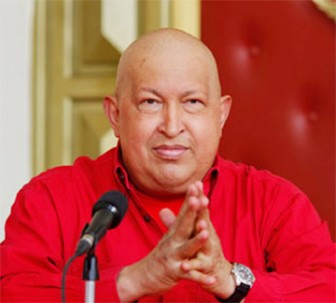Venezuelan President Hugo Chávez’s admission that he will undergo new cancer surgery raises a whole set of new questions about the viability of his narcissist-Leninist “revolution” both at home and throughout Latin America.
Many of us who thought that Chávez would win the Oct 7 elections thanks to a combination of a massive use of state resources to buy votes, a virtual monopoly of the air-waves and intimidation of opposition voters, will have to rethink our forecasts. Chávez may still win, but it’s not that sure any more.
Chávez’s admission that his cancer treatment will slow him down — “I can’t keep up this pace,” he said Tuesday — and the massive show of support for 39-year-old presidential candidate Henrique Capriles Radonski in the Feb 12 opposition primary elections are two factors that are bound to have a big impact on the presidential race.
All of a sudden, Chávez has lost his aura of invincibility. Venezuelan political insiders are no longer discussing whether Chávez will stay in power “beyond 2019” — as he claimed as recently as Feb 18 — but whether he will be president by the end of this year.
There are three major scenarios of what may happen in Venezuela in coming months:
■ Scenario 1: Nothing changes. Chávez slows down his campaign, but remains on the ballot for the October presidential elections.
Chávez could win, if — in addition to around-the-clock propaganda and intimidation campaigns — his government benefits from a big rise in oil prices from a potential Israeli attack on Iran’s nuclear facilities. That would give the Venezuelan government extra cash to hand out to voters.
 Also, the ‘pity effect‘ of Venezuelans who may feel emotionally closer to an ailing leader could help Chávez at the ballot box, although such feelings may now be offset by anger over the president’s clumsy denials of rumours about his health that turned out to be true.
Also, the ‘pity effect‘ of Venezuelans who may feel emotionally closer to an ailing leader could help Chávez at the ballot box, although such feelings may now be offset by anger over the president’s clumsy denials of rumours about his health that turned out to be true.
■ Scenario 2: Chávez appoints a successor. Chávez’s health deteriorates, and — pretty much like Cuba’s Fidel Castro did when he announced July 31, 2006, that he would undergo surgery and was provisionally ceding his powers to his brother Raúl — the Venezuelan president appoints a substitute to run in the October elections.
Cuba, which relies heavily on Chávez’s petrodollars and is most concerned about maintaining the status quo in Venezuela, will be the first to recommend its own Fidel-to-Raúl succession model to Chávez, in which Chávez would remain a largely behind-the-scenes “father of the revolution.”
Still, without Chávez’s constant presence in the media, his successor could lose the October elections. Polls show that Chávez is much more popular than his notoriously corrupt and inept government. In addition, electoral trends in recent years have shown steady gains for the opposition: anti-Chávez candidates won 52 per cent of the vote in the 2010 legislative elections, and got an unexpectedly high 3 million votes in this month’s opposition primaries.

■ Scenario 3: A military intervention, or ‘the Egyptian scenario.‘ Chávez becomes incapacitated or dies in the coming months, and the likelihood of an opposition victory in the October elections moves the Venezuelan military to create a provisional government, claiming that the country has become ungovernable.
Chávez’s top generals would have the most to lose if the regime falls. Some of the generals, including Defence Minister Gen Henry Rangel Silva, are wanted by US law enforcement agencies on drug trafficking charges, while others fear corruption probes if the opposition wins the elections.
“To avoid losing power, the military may claim that the country is on the verge of a supposed civil war and intervene,” says Caracas-based public affairs consultant and pollster Alfredo Keller. “If Chávez disappears, an Egyptian scenario is highly possible.”
My opinion: Any of these three scenarios is possible, but in the interest of preserving what is left of Venezuelan democracy, the Obama administration and Latin American governments should warn Venezuela’s military that they will not accept an ‘Egyptian scenario.‘
The last thing Latin America needs following the steady erosion of democratic freedoms in Venezuela, Nicaragua, Bolivia, Ecuador and other countries in recent years is a return of military juntas. The first two scenarios — no matter who wins — is preferable to the third one.
© The Miami Herald, 2012. Distributed by Knight Ridder/Tribune Media Services.









